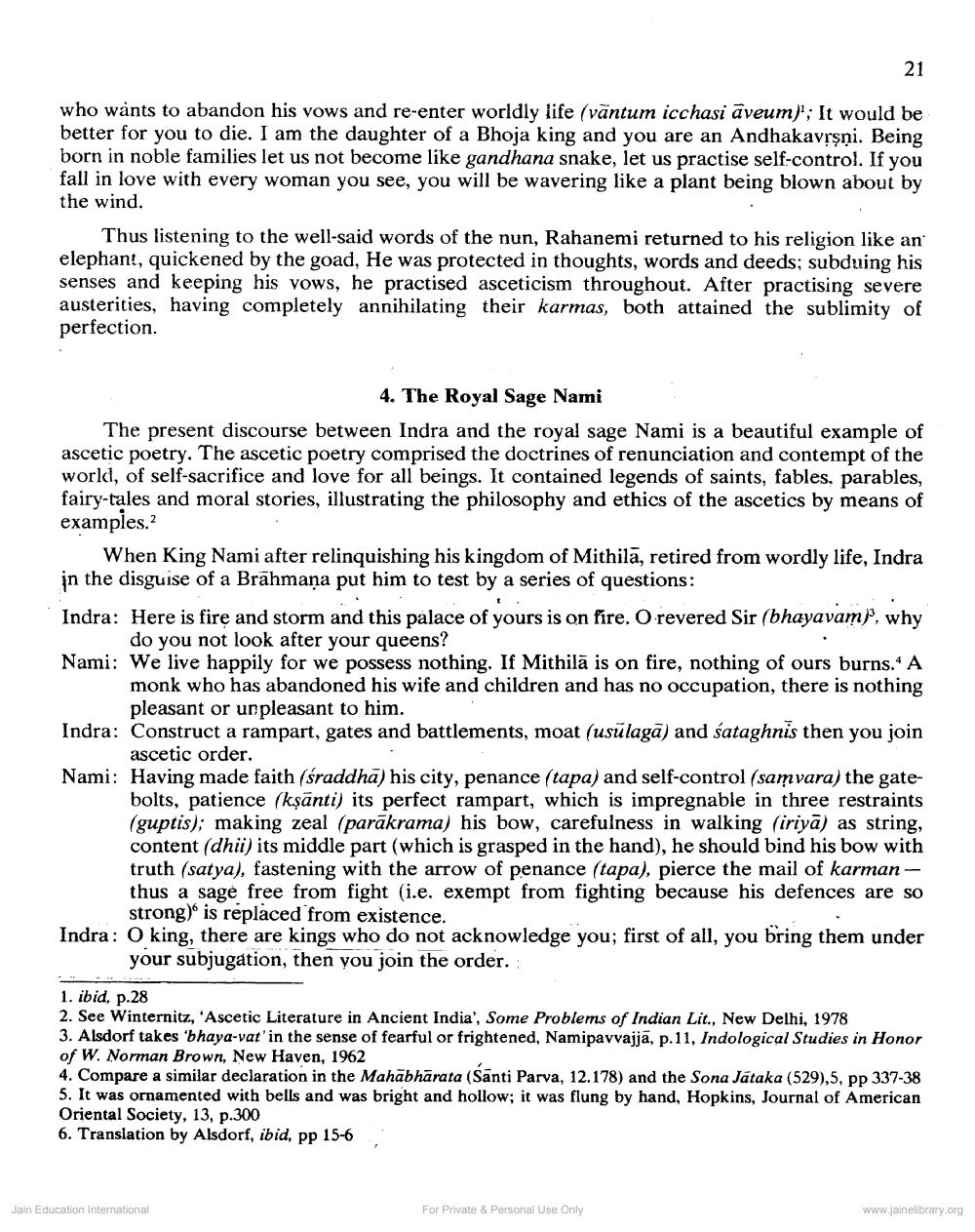________________
who wants to abandon his vows and re-enter worldly life (väntum icchasi aveum); It would be better for you to die. I am the daughter of a Bhoja king and you are an Andhakavṛṣṇi. Being born in noble families let us not become like gandhana snake, let us practise self-control. If you fall in love with every woman you see, you will be wavering like a plant being blown about by
the wind.
21
Thus listening to the well-said words of the nun, Rahanemi returned to his religion like an elephant, quickened by the goad, He was protected in thoughts, words and deeds; subduing his senses and keeping his vows, he practised asceticism throughout. After practising severe austerities, having completely annihilating their karmas, both attained the sublimity of perfection.
4. The Royal Sage Nami
The present discourse between Indra and the royal sage Nami is a beautiful example of ascetic poetry. The ascetic poetry comprised the doctrines of renunciation and contempt of the world, of self-sacrifice and love for all beings. It contained legends of saints, fables, parables, fairy-tales and moral stories, illustrating the philosophy and ethics of the ascetics by means of examples.2
When King Nami after relinquishing his kingdom of Mithila, retired from wordly life, Indra in the disguise of a Brahmana put him to test by a series of questions:
Indra: Here is fire and storm and this palace of yours is on fire. O revered Sir (bhayavamp, why do you not look after your queens?
Nami: We live happily for we possess nothing. If Mithila is on fire, nothing of ours burns." A monk who has abandoned his wife and children and has no occupation, there is nothing pleasant or unpleasant to him.
Indra: Construct a rampart, gates and battlements, moat (usulaga) and sataghnis then you join
ascetic order.
Nami: Having made faith (śraddha) his city, penance (tapa) and self-control (samvara) the gatebolts, patience (ksanti) its perfect rampart, which is impregnable in three restraints (guptis); making zeal (parakrama) his bow, carefulness in walking (iriya) as string, content (dhii) its middle part (which is grasped in the hand), he should bind his bow with truth (satya), fastening with the arrow of penance (tapa), pierce the mail of karmanthus a sage free from fight (i.e. exempt from fighting because his defences are so strong) is replaced from existence.
Indra: O king, there are kings who do not acknowledge you; first of all, you bring them under your subjugation, then you join the order.
1. ibid, p.28
2. See Winternitz, 'Ascetic Literature in Ancient India', Some Problems of Indian Lit., New Delhi, 1978
3. Alsdorf takes 'bhaya-vat' in the sense of fearful or frightened, Namipavvajjā, p.11, Indological Studies in Honor of W. Norman Brown, New Haven, 1962
4. Compare a similar declaration in the Mahabharata (Santi Parva, 12.178) and the Sona Jātaka (529),5, pp 337-38 5. It was ornamented with bells and was bright and hollow; it was flung by hand, Hopkins, Journal of American Oriental Society, 13, p.300
6. Translation by Alsdorf, ibid, pp 15-6
Jain Education International
For Private & Personal Use Only
www.jainelibrary.org




